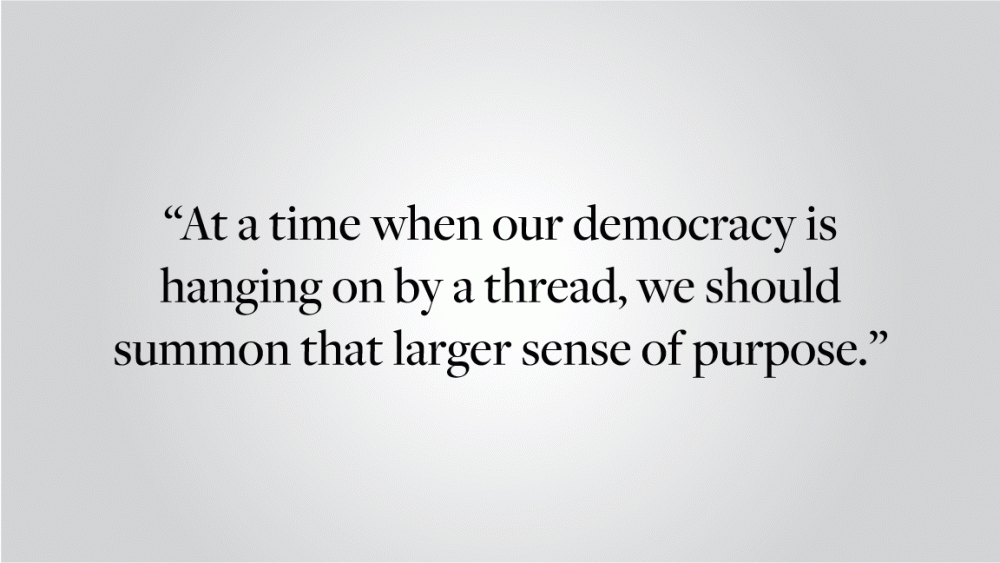The first presidential debate was difficult to watch, and it wasn’t because of Joe Biden. As a proud Democrat, Donald Trump’s lies, temper tantrums and interruptions drove me insane, but I’ll cut right to the chase: Now is not the time to lose hope nor to grow complacent. Marc Elias, arguably the most well-known Democratic voting rights lawyer in America, put it best in a recent tweet. “After last night's debate, we must ask more of ourselves and our neighbors. We cannot outsource the protection of our democracy to others. We are all responsible to show civic courage in public. Ask yourself: What did you do when Democracy was at stake?”
I’m writing this piece to recommend that every Brunonian do three things that can make a tangible and positive difference.
First, remember that we’re in an “election season” and act accordingly. Last week, I phone banked for the Michigan Democratic Party, and one of the individuals leading the event exclaimed during her presentation to volunteers, “We’re already in the middle of the election, folks! Don’t just think about Election Day. This is an election season!” There’s no doubt about it. More than one million Americans have already cast their ballots. If your state offers early voting, take advantage of that opportunity and encourage others to do the same. In particular, if your state offers early in-person voting and you’re not among the high-risk groups for COVID-19, do early in-person voting. You’ll avoid the possibility of getting your mail-in ballot rejected, which can happen for various reasons, and you’ll help ease congestion at polling places on Election Day. Of course, there’s nothing wrong with voting by mail; just make sure to read carefully all the instructions.
Second, familiarize yourself with down-ballot races. In February, I wrote that Sen. Mitch McConnell (R-K.Y.) was stacking our federal courts with extremely conservative judges and that the way to stop him was to flip the Senate from Republican to Democratic control. In light of Justice Ruth Bader Ginsburg's death, I believe that more than ever before. However, there are a plethora of other important races this November. For example, in Texas, the State Supreme Court is currently composed of eight Republican justices and one vacant seat. But the Texas Democratic Party is aggressively targeting the four justices who are facing reelection. In Michigan, Republican-nominated justices hold a 4-3 majority on the State Supreme Court, but that can change because two of those seats are up for grabs. In Montana, a young Democratic lawyer is running for Attorney General on a bold platform as he seeks to replace the outgoing Republican Attorney General. In my hometown of Los Angeles, there’s a District Attorney race and one of the candidates is committed to pursuing important criminal justice reforms.
Finally, complete the Census questionnaire. In short, if you don’t fill out the Census questionnaire, you will not be counted, and if you’re not counted, your community will not receive its fair share of federal funds for things like Medicare, Federal Pell Grants and highway construction programs, and your state can lose seats in the U.S. House of Representatives, among other things. Already, getting an accurate count of students who live in off-campus housing that’s not university-owned or managed is proving especially challenging for college towns, with the Census Bureau saying “college students should be counted where they would have been on April 1 — at school — if not for the outbreak” and asking off-campus roommates to “submit only one response that includes everyone who lives there.” For context, because Trump’s “law and order” administration violated a court order, the Census Bureau is being required to continue its counting efforts until Oct. 31 and to allow people to submit their questionnaire until that date, too. The matter may ultimately make its way up to the Supreme Court. Completing the Census takes less than 10 minutes and you can do it online. If you’ve already completed it, ask others in your life whether they have.
I loved my four years at Brown in large part because my classmates were overwhelmingly concerned not just with earning good grades, but with bettering the world around them in any way that they could. To me, that’s why Brown stands out among both Ivy League and non-Ivy League institutions. At a time when our democracy is hanging on by a thread, we should summon that larger sense of purpose.
Let’s get to work.
Walter García is a third-year student at the Northwestern Pritzker School of Law. He can be reached at waltergarcia2021@nlaw.northwestern.edu. Please send responses to this opinion to letters@browndailyherald.com and op-eds to opinions@browndailyherald.com.

ADVERTISEMENT




